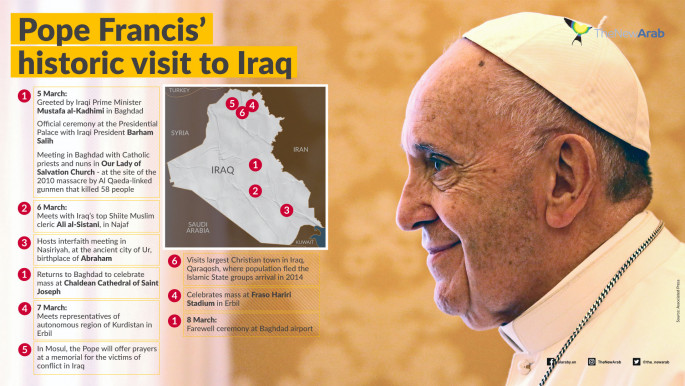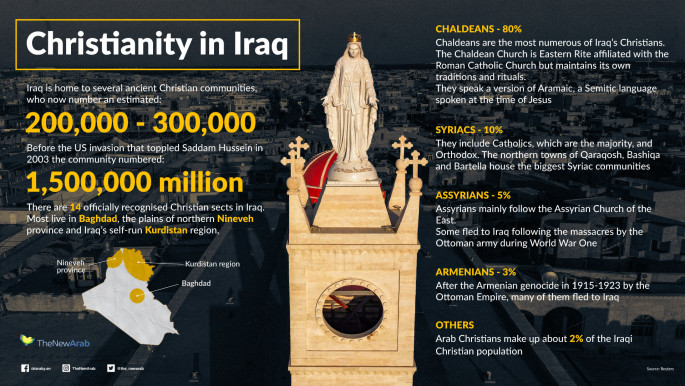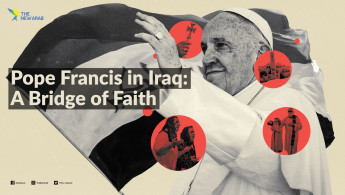Explainer: Why Pope Francis' historic visit to Iraq is so significant
Editor's note: This article is part of our special coverage of Pope Francis' visit to Iraq. The rest of our coverage can be accessed on this regularly updated portal
A few hours after rockets hit the Ain Al-Asad airbase on Wednesday, which hosts US, coalition and Iraqi forces, Pope Francis at his general audience declared with a firm voice that he would not be discouraged from his historic trip.
It will be the first-ever papal visit to Iraq and its historic significance becomes even more relevant at a time when the country faces renewed violence and a second wave of coronavirus cases that has led to curfews and a lockdown.
Pope Francis, 84, is due to arrive in the land of the two rivers on Friday, 5 March. His three-day pilgrimage will take him to Baghdad, Najaf, Nasiriyah, Ur, Erbil, Mosul and Qaraqosh. A gruelling schedule will see the Holy Father meet a number of religious figures of the Christian faith, among them Cardinal Louis Raphael Sako, the Chaldean Patriarch of Baghdad.
While the meaning of the pontiff's visit for the Christian community in Iraq cannot be overstated, it also transcends the country's geographic borders, reaching different religious communities in the Middle East.
Although a religious pilgrimage, it also takes on a political message. As stated in the Encyclical "Fratelli tutti" (All Brothers) signed by Pope Francis last October, emphasis is placed on the values of fraternity and social friendship as a means to build a more just and peaceful world, holding all to account: people, institutions, international organisations and civil society.
 |
While the meaning of the Pope's visit for Iraqi Christians cannot be overstated, it also transcends the country's geographic borders, reaching different religious communities in the Middle East |  |
In particular, when applied to Iraq and the wider region, this refers to the Holy Father's explicit support of youth and popular movements that have been requesting change through access to socio-economic improvement and justice.
As noted by Middle East analyst Lorenzo Trombetta in Beirut, "while we cannot expect immediate effects from the apostolic visit of a religious figure, he [Pope Francis] also has a political role. We must also take into account that his message strongly supports the popular demands expressed by youth in these countries".
Furthermore, Trombetta highlights how the term 'fraternity' used by the Vatican lexicon also signifies 'citizenship' within a state under the rule of law, with equal rights for all. Hence the individual is no longer reduced to being a member of a single community that is protected by his own leader but is part of a wider system.
On his second day in Iraq, 6 March, Pope Francis will fly to Najaf to meet Grand Ayatollah Ali al-Sistani. The fact that the meeting will take place in Najaf and not in Baghdad carries its own weight: the city is the epicentre of Shia Islam.
 |
|
| Click to enlarge |
Significantly, al-Sistani, 90, has supported the youth protests since 2017 and in particular in 2019. He also formed four militias in 2014 to counter the Islamic State (IS) and issued a fatwa (non-binding legal opinion in Islamic law) authorising Iraqi citizens to take up arms to combat IS. Al-Sistani should thus be seen as a religious figure of pan-Islamic and pan-Shia dimensions who is also integrated into aspects of Iraqi politics.
Pope Francis' meeting with the Grand Ayatollah will take place behind closed doors as a private meeting. It follows another significant trip the Holy Father took to promote interfaith dialogue in Abu Dhabi on 4 February, 2019 where he met with the Sunni religious figure, Grand Imam Ahmed el-Tayeb of Egypt's Al-Azhar mosque.
The trip to Iraq completes this interreligious dialogue. This is also why the Pope's message transcends Iraqi borders and its immediate effects will be felt beyond the current enthusiasm on the streets. It is a way of launching a message of hope for future generations who are demonstrating in different countries in the region.
 |
The mere fact that the trip is taking place will be a legacy which could help to plant seeds of peace in the land of the two rivers and beyond |  |
Another extremely significant moment of his visit will take place in Mosul on 7 March when he will pray in remembrance of the victims of war. It should be noted that Mosul, more often remembered for the horrors it underwent under IS, had also actively participated in the 2011 protests widely referred to as the 'Arab Spring'. On the same day, the Pope will then take a helicopter ride to the city of Qaraqosh.
There he will visit the Church of the Immaculate Conception. Father George Jahola, a Syriac Catholic priest who grew up in Qaraqosh and who has helped with efforts to rebuild the city after IS, is enthusiastic about the Pope's visit.
The priest has been a crucial element in supporting the resettlement of about 25,650 Christians who had fled to Lebanon and Turkey. With a vibrant voice he notes: "People had to abandon their homes to escape from IS; the Holy Father's visit here is a special medicine for the wounds of the community. It is a way of telling us we are not forgotten".
 |
|
| Click to enlarge |
The Vatican does not have its own private plane, and Pope Francis and his entourage, together with a number of international media representatives, will be flying out of Rome on an Alitalia flight (the Italian national airline) chartered for the trip. The Holy Father, as is an established practice when possible for his trips, will stay at the Apostolic Nunciature of the Holy See, in this instance in Baghdad, and will move to different cities daily by plane and helicopter.
While security has been a concern, the Vatican is understandably tight-lipped about arrangements. Unlike most other visits, the Pope will be using an armoured vehicle while in Iraq. As Vatican expert Prof. Massimo Faggioli noted "the sheer number of cities and towns the Pope will visit on this trip is extraordinary".
In a country that is the world's fourth largest producer of oil but is unable to ensure electricity 24/7 to its citizens; where there is rising inflation; where protests are raging (most recently in Nasiriyah just a short distance away from where Pope Francis and Grand Ayatollah Ali al-Sistani will meet) the Holy Father's message is certainly a powerful one, but it is unlikely to have an immediate impact on everyday citizens' lives.
Yet, times change and the mere fact that the trip is taking place will be a legacy which could help to plant seeds of peace in the land of the two rivers and beyond.
Gaja Pellegrini-Bettoli is a freelance journalist based in Beirut and focusing on the MENA region. Her articles appear in Al Jazeera, Middle East Eye, Al-Monitor, E.U. Observer, France24, Opendemocracy and the Atlantic Treaty Association.
Follow her on Twitter: @gajapell

![sudan women [getty] sudan women [getty]](/sites/default/files/styles/image_330x185/public/media/images/5019D7F4-52AF-4377-8A05-885D27476479.jpg?h=d1cb525d&itok=tKXV7r-W)
